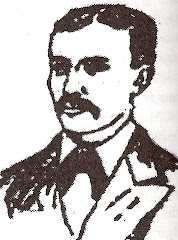James Titus served 19 years for the 1886 murder of Tillie Smith before he was paroled by the Court of Pardons and released from prision on December 27, 1904. For the nearly fifty years that followed, he lived ironically, in Hackettstown, amongst the same neighbors and townsfolk who championed his conviction. James Titus died in June 1952 and is buried in Union Cemetery, Hackettstown. Unfortunately, no one will ever really know the truth about happened that fateful night or if justice was truly served.
Erik B. Anderson doesn't like it when someone says "no one will ever really know the truth," perhaps it's because he loved the X-Files so much in college. In the spring of 2009, he read on Wikipedia that:
The American Heritage Dictionary’s usage panel found it unacceptable to use the word ironic to describe mere unfortunate coincidences or surprising disappointments that “suggest no particular lessons about human vanity or folly.”
So he wrote to the American Heritage Dictionary Usage Panel. They ruled in July, but it took three tries to get this letter to him:
So there you have it, the use of the word ironically is "somewhat misleading" when the Hackettstown Historical Society uses it to refer to James Titus living in Hackettstown, among the townspeople who wanted to kill him, for nearly fifty years after he served his sentence. So I ask the Hackettstown Historical Society: Can they defend their use of the word ironically in this article?
Furthermore, what is so ironic about the building that Tillie Smith was allegedly raped and murdered in burning to the ground on Halloween night? The American Heritage Dictionary Editors think that statement is "somewhat misleading" too. Normally, one doesn't think of a historic society publication as being "sensational," but there it is. Right before your eyes.
Anybody want to buy a T-shirt?
Warm Regards,
Erik B. Anderson
Independence Township, New Jersey
Established 1782




No comments:
Post a Comment